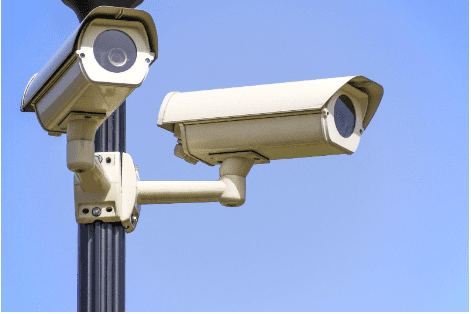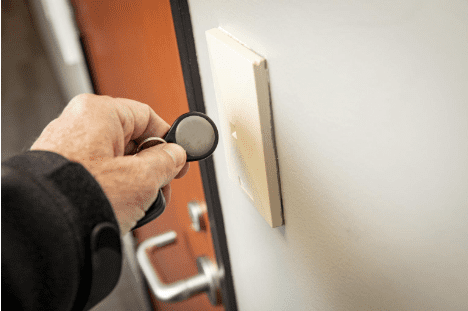In general, a home security system is a set of electronic devices that work together to ensure the safety of a house. These electronic devices work with a central control panel to keep burglars and other unwanted people out of your home.
Usually, a home security system would consist of:
a control panel.
The doors and windows have sensors.
Motion sensors on the outside and inside
Cameras for security can be wired or wireless.
A loud alarm siren or a loud siren
stickers for the windows and a yard sign.
How do home security systems work?
The basic idea behind home security systems is to protect your home’s entrances with sensors that talk to a command centre or control panel in a convenient location.
Most of the time, the sensors are put in doors that lead into or out of a house. also in windows that are easy to open, especially ones at ground level. Motion sensors can also be used to keep open areas of a house safe.
Control Panel
This is the computer that turns on and off security systems, talks to alarm monitoring companies, and sounds an alarm when security zones are broken.
They usually have a touchpad that enables users to program and interact with them. They can be turned on and off with a password. In addition, they can be controlled by voice command and a key fob, which is a wireless remote.
Window and Door Sensors
The door and window sensors are made up of two parts that are put together next to each other. The device has two parts. The first part covers the window or door, and the second part covers the sill. Both sensors are triggered when a door or window shuts. Consequently, the circuit is formed.
These sensors inform the control panel that the entry point is secure when the security system is turned on. If a monitored window or door is opened suddenly, the security circuit will be broken. The control panel will see this as a breach in the secure zone. A loud alarm goes off most of the time, and the monitoring company is notified immediately.
Detectors of movement
Motion sensors should be placed in an entryway or hallway on the ground floor so they can detect movement and allow us to know when our security system is on. Because some motion sensors are sensitive to animals, they don’t always go off when our dog walks by.
Surveillance Cameras
There are wired and wireless versions of these surveillance cameras, and they can be used in many ways to improve your security system.
It is often used for keeping track of things:
It might be hard to see faraway places or parts of your property.
Structures like garages, barns, and workshops that are far away
Outside and inside entrances, like garage doors or front doors, are essential.
You can check on surveillance cameras from your computer, smartphone, or tablet. These cameras are used to monitor deliveries, watch for kids coming home from school, and keep an eye out for service workers like gardeners and babysitters. They can also help identify security holes in buildings. This could include a video of the break-in and maybe even the used car.
Motion sensor
Motion sensors should be put in a home’s main entryway or hallway on the ground floor so they can detect movement and let us know when our security system is on. Because some motion sensors are sensitive to animals, they don’t always go off when our dog walks by.
Entry Switch
Entry sensors, also called contact sensors, have two parts: one goes on the window or door, and the other goes on the frame. Magnets help these sensors determine if one of these doors is open or closed. If the sensor thinks a door or window has been opened, it will let us know. We think entry sensors should be put on windows or doors on the first floor. Most are battery-powered, and many have adhesive backs to make them easy to put up.
To avoid setting off entry sensors, thieves sometimes break windows rather than open them. But a glass break sensor can also pick up on the sound of glass breaking and send us a text message.
Siren
In in-home security systems, sirens can be used by themselves or as part of other devices, like the base station, which we’ll talk about below. Alarms often go off at the same time as sirens. They are meant to scare away intruders or let our neighbours know something is wrong.
Keypad
Most security systems need a code to be turned on or off. Codes are typically entered on a keypad, either mounted on the wall or placed on a flat surface.
Our cars have keys, so why not have them for our security system? We don’t have to use a keypad to arm or disarm our security system with key fobs. They are great for when I am upstairs and do not want to get out of bed.
Fob
A fob, also called a key fob, is a small piece of security hardware with built-in authentication that is used to control and protect access to mobile devices, computer systems, network services, and data. The key fob shows an access code that is generated at random and changes every 30 to 60 seconds, on average. Users will first enter their personal identification number (PIN) on the key fob. Then, they will enter the current code that is shown on the device.
Panic button: With this button, you can quickly and easily call the police, the hospital, or fire department. Like key fobs, panic buttons don’t have a specific installation, but we always have one nearby in an emergency. We think everyone should keep at least one on their nightstand.
Base station: Base stations connect all of the devices connected to our mobile app to get those notifications we talked about earlier. Think of it as a station like Grand Central where trains (IoT security devices) pass through.
Yard signs and/or window stickers: Many security companies provide yard signs and/or window stickers to indicate that we have security systems. This is a good idea since most thieves will flee if they see a security system.
Carbon monoxide and smoke detectors are recommended for every home. With this easy-to-use tool, we’ll know if the air in our home gets too bad to breathe.
Security system parts are very different from one system to the next. Some companies only use sensors, while others use all of these and more.
What will happen if someone breaks in?
Security systems are made to do certain things when a secure area is broken into. Depending on what kind of security system you have, different things will happen if someone breaks in.
Security systems that are watched over by pros If there is a problem with the safety of your home. The monitoring company is also told when the alarm goes off at a high decibel level. If the control panel is set up for 2-Way Voice communication or the emergency number, a trained security specialist might try to get in touch with the homeowner.
These security systems can talk to the company that watches over them in several ways, such as:
The home phone line will still work even if there is no backup power.
wirelessly using cellular radio frequencies, just like cell phones use. These also work when the power goes out and have a backup battery.
Voice over Internet Protocol, or VoIP, is a way to talk that works even when the phone lines are down.
Through the Internet. Even if the power goes out, this is also a good choice.
In an emergency, the monitoring company will let the right people in your area know what’s happening. Included are paramedics, firefighters, police officers, and others who help in emergencies. The monitoring company will try to get in touch with you until the emergency response team gets to your house.
Homeowners or people they choose can be notified by text message or email when there is a security breach.
Security systems that aren’t watched over by professionals: There are a lot of do-it-yourself systems on the market right now. If this type of security system has been implemented, a loud alarm will go off if someone breaks in. The homeowner must call 911 for police, fire, or any other emergency help.
With these systems, if there is a security breach, text messages and emails can be sent to the homeowners. It all depends on who you choose as your provider.
What are the best indoor cameras in Canada?
According to Privacy Canada, these are the top indoor surveillance cameras,
Best Indoor Cameras
- Frontpoint Premium Indoor Camera.
- Wyze Cam Pan.
- Google Nest Cam Indoor.
- Frontpoint Outdoor Camera.
- Google Nest Cam IQ Outdoor.
- Ezviz C3W ezGuard Wi-Fi Security Camera.
- Netgear Arlo Pro 3 – Best Wireless Home Security Camera.
- Essential Aspects of a Security Camera.
Smart home security has both pros and cons.
Things around the house are getting smarter. Smart products have become very popular in the last ten years because they can connect to other devices and work together to create a system for any kind of home. Smart systems take care of everything from TVs to heating, but how well do they protect your home? How safe should it be for you to depend on them?
Even though there is no easy answer to either of these questions, we thought it would be helpful to provide a few pros and cons of smart home security systems:
Pros
The Comfort
It should be obvious that a system of smart security devices that work together is easier to use and can enhance your life in many ways. Some products, like video doorbells, let you look at the front of your house from anywhere using your smartphone. In contrast, smart locks eliminate the need for keys while keeping your home safe. This makes smart home security systems easier to use and more convenient than older ones.
Peace of mind is better.
Most smart home devices can be controlled from outside the house, which gives a lot of security and peace of mind. It means that homeowners can check their alarms or cameras from anywhere, so they can relax when they’re away and find out quickly if there’s a problem.
Easy Upgrades
Using smart home products also makes it easy to build a security system at your own pace while starting small. Smart plugs, for example, can be used to leave lights on while you’re away. If you choose, you can upgrade to smart alarms or video doorbells if they’re more expensive.
On the other hand, unique upgrade ideas like Smart Security Drones are available for people who want something more complete. Because of this, smart home security can be done in a lot of different ways, thanks to its flexibility.
Cons
We’ve talked before about how private the information people give to their smart devices is. Even though smart home security is getting better and problems are rare, data breaches and cyberattacks do happen and should be considered when deciding which devices to buy. Regarding security, smart homes can depend on the internet, leaving room for error.
Alarms
Smart security products can pick up a lot of information, which is usually good. However, this can lead to some false alarms. This can be a little annoying, and some people might feel a little uneasy about putting all of their home security trust in smart technology.
Smart home security is expensive.
As we’ve already talked about, the price of smart security systems can vary quite a bit. Smart alarms, doorbells, and locks can be very expensive, though, because much of this technology is still pretty new. So, if you are on a tight budget, it might be a good idea to look at your current home security and see where you could improve.
Why Hire a Home Security Company?
You know that your needs for security at home are unique. The needs of a home owner are different from those of a business owner or owner of commercial property. You might use Wi-Fi or a cell phone network to run your business from home. You live alone or with your family, right? A good security company will have different solutions for each of these situations.
In the same way, there are a lot of security companies in Van Cuevar. Some are well-known national brands, while others are smaller security firms. A licenced home security company in your area. A local company may be better able to meet your needs than a national one. You know that security is about more than just security guards, tools, and services.
Please follow these tips before hiring a security company:
- Research on scope of the services offered by the home security company
- Check the company’s monitoring systems
- Does the company offer rental security equipment?
- Do they offer “free” security equipment?
Important questions to ask before hiring a home security company
1) What services do they provide?
2) Is the security company owned by local people or is it a national chain?
3) How much does the security company care about its clients?
4) Is security the most important thing for the agency?
5) Does the company that protects your home have a great reputation?
6) Is the company for home security ready to meet your needs?
7) Is the company licenced and covered by insurance?




































